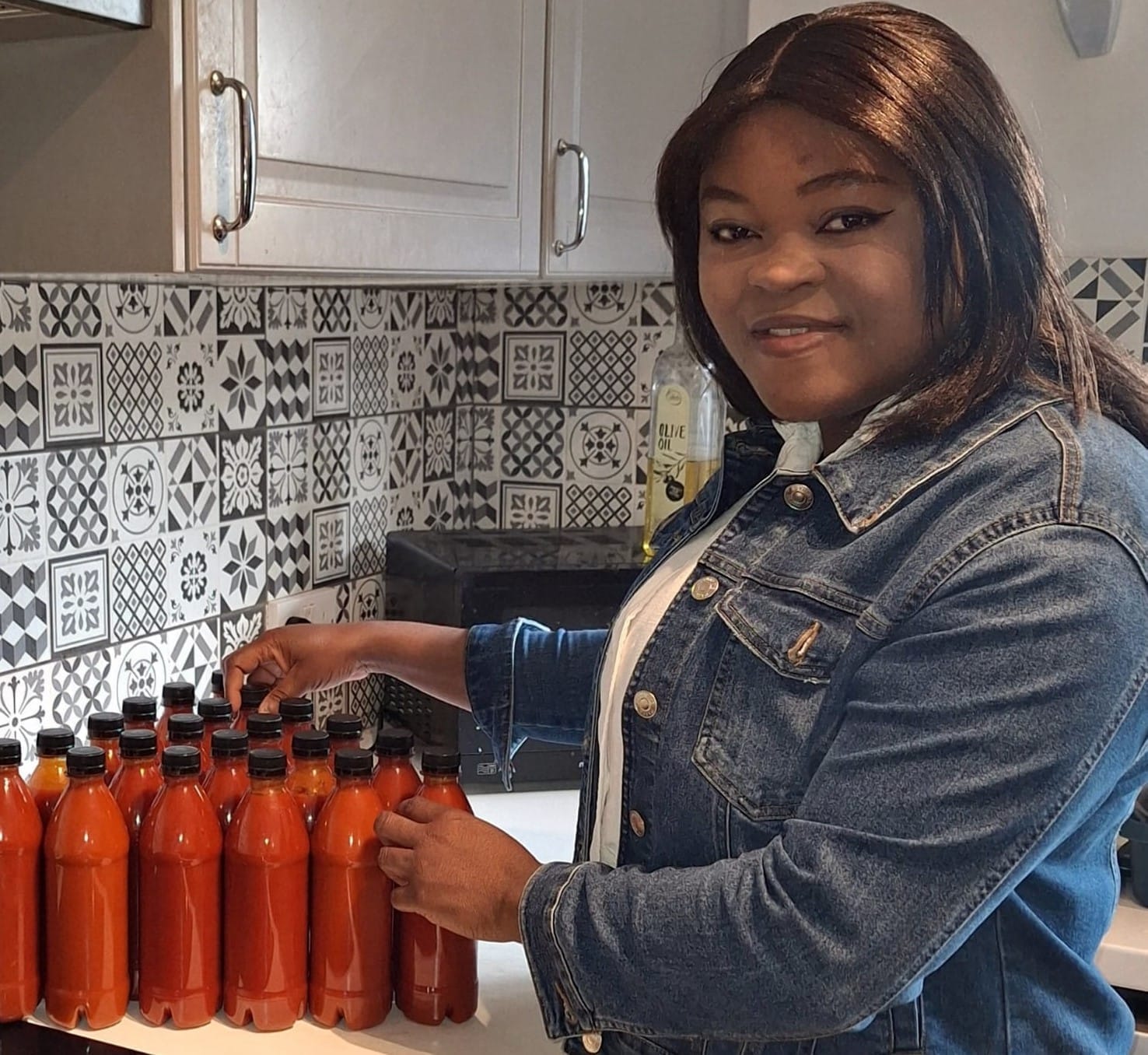10 Financial Challenges Black Immigrants Face in the UK (And Practical Solutions to Overcome Them)
Welcome to the UK

When I first moved to the UK, I quickly realized that building financial stability wouldn’t be easy. The systems back home were completely different and money speaks a different language.
I found it difficult even to open a bank account - you know the Catch-22 'We need a permanent address to open a bank account for you' and when you try to get a house you'll hear, ' We need a bank statement to get you a permanent address'. Don't get me started on getting a job Catch-22.
As a Black immigrant, I faced hurdles I hadn’t even anticipated—but I also discovered ways to overcome them.
In this post, I’ll share the key financial challenges I’ve experienced—and seen others face—and provide practical solutions that can help you thrive, even without access to public funds.
Financial Challenges Faced by Black Immigrants in the UK

1. Limited Access to Banking Services
Many banks will not offer you their services without a UK address and other documentation. This barrier prevented me from easily managing my money, receiving payments, or even building a credit history.
Banks often require proof of address or a lengthy financial history to open an account. When you've just arrived, these requirements can be difficult to meet.
Your best bet is to get digital-only banks like Monzo or Revolut. They are excellent choices with more flexibility and less stringent requirements for documentation.
2. Barriers to Employment
One of the toughest challenges many Black immigrants face is finding stable, well-paying jobs. I witnessed firsthand the non-recognition of foreign qualifications and foreign work experiences especially against the part of the world where we come from as immigrants.
I was lucky to meet a mentor who taught me to forget my qualifications and experiences, get into the sector where jobs and documentation are easily available, and work my way from there - it was great advice.
Do not despise any job, especially to help you get settled financially and with documentation. Do not forget your dreams and goals either, but get a stable job and gain professional certification and conversion courses, and side-hustle practices. It could take a year or more but you will get there.
3. Limited Access to Affordable Housing
Securing affordable housing can be a huge challenge. As a Black immigrant, I lost some deposits, because I could not get guarantors and references.
Landlords and estate agents harbor biases especially against Black immigrants because of they do not have the necessary references or credit scores that landlords look for. Getting a house in the UK is a hard task as the viewing attracts a lineup of potential tenants, and from experience we had to bid.
You have to consider shared housing arrangements, especially in large cities, where this is a common solution so that you can save up deposits and get credit scores and/or references/guarantors to build trust.
4. Lack of Tailored Financial Education
One truth all Black immigrants must accept is that the money system of wherever we come from is not the same with the UK. All our beliefs about money and wealth creation is therefore ineffective.
I had little guidance at first and got confuse about how things like taxes, credit, benefits, worked. Someone from a different country and cultural background could lack understanding that can lead to poor financial decisions. The UK financial system is complex, and existing resources often fail to address the unique challenges that immigrants face. In many cases, Black immigrants may also have specific cultural needs that aren’t met by mainstream financial education.
It is important to learn more about financial literacy and seek out guidance from local financial advisers.
5. Racial Wealth Disparities
As a Black immigrant, the widening racial wealth gap is glaring. Elements of the causes can be deeply rooted in history but personally I believe it is time we stop the blame game and take responsibility for our children and their children.
The Black community is one of the flambouant and hence extravagant culture. it is easier to blame it on discrimination in employment, education, and housing than replacing this financially distructive habit.
Change your circle of friends if all you do is get each other to engage in extravaganzas. Instead begin to save, or join peer-to-peer saving groups. which can provide financial support and help build a community of mutual aid.
Remember not to limit yourself to your job but equip yourself for long term transition into high-demand skills or self-employment to access better-paying jobs and create new wealth-building opportunities.
6. High Costs of Immigration Processes
In simple terms, the UK is expensive to stay but so also is the UK’s immigration system. Legal fees for visas,visa renewals, residency applications, and work permits can quickly add up, leaving immigrants financially drained.
For Black immigrants, these costs are a heavy financial burden, especially for those who are not entitled to public funds.
As a Black immigrant, dont get carried away by the allure and glamour the opporutnity to live in the UK bring. While tours and vacation can be so sweet, plan ahead by budgeting and saving for immigration-related costs long before the set date. Set aside a portion of income each month to cover such cost.
There are a lot of opportunities for pro-bono services offered by immigrant advocacy organizations or lots of stuff that you can do yourself with little attention and time.
7. Challenges from Black Tax
Sending money back home has been a major impediment to the financial prosperity of many Black immigrants. Black Tax either for family needs or financing some shop (business) back home, has been help that is financial sucide.
Remember these:
1. You may not be as wealthy as you think you are, you only feel so because of high exchange rate back home.
2. You may only be a cash-cow for family members and nobody will be willing to or able to save you from your financial woes begin here in the UK.
3. If you must send money home know who truly deserve 'help', and in my opionion, it should be on a budget and not on the person's needs.
8. Inability to Access Public Funds or Support
A major challenge for Black immigrants is the “No Recourse to Public Funds” (NRPF) condition, which prevents them from accessing government benefits during times of need. Many visa categories in the UK carry the NRPF condition, meaning immigrants are not eligible for benefits such as Universal Credit or housing assistance.
Again, Public Funds itself is an entrapment of both the mind and body. The conditions are not suitable for a viable financial mind. There are one or two good things to pick off it but I have learnt that Public Funds do more harm than good, if you depend on it for your financial future.
9. Difficulty Starting a Business or Accessing Business Financing
Many Black immigrants have entrepreneurial ambitions but face significant challenges in securing business loans or capital to get started.
Systemic bias in lending practices, along with the lack of established credit histories, makes it difficult for Black immigrants to access business financing.
This problem will not go away anytime soon, but millions of Blacks and Black immigrants have soared above these challenges by exploring peer-to-peer lending and crowdfunding. It is important to begin now to network with the right people, groups, or business incubators.
10. Systemic Discrimination in Financial Systems
Due to Redlining, many Black immigrants face bias when accessing financial services such as loans, credit cards, and insurance, often leading to higher costs or outright denial of services.
Advocacy is needed to achieve fair treatment but it is important to access alternative financial services as soon as possible. Again, joining peer-to-peer savings and lending is a good way to get finance in the UK.
Conclusion

Navigating the financial landscape as a Black immigrant in the UK can be overwhelming, and I’ve faced my fair share of challenges. From limited access to banking services to dealing with racial wealth disparities, there were times when it felt like these barriers were too big to overcome. But as I’ve learned, understanding these obstacles and finding practical solutions can make all the difference.
I’ve discovered that by using alternative banking options, seeking support from the community, and focusing on building wealth through skills and entrepreneurship, it’s possible to create a stable financial future. Patience and persistence have been key, and with the right resources and mindset, financial independence is within reach.
It’s important to remember that we are not alone on this journey. Despite the challenges, we collectively have what it takes to educate ourselves, empower each other, and work toward financial success.
Join StandTall Community for free
Created with © systeme.io


